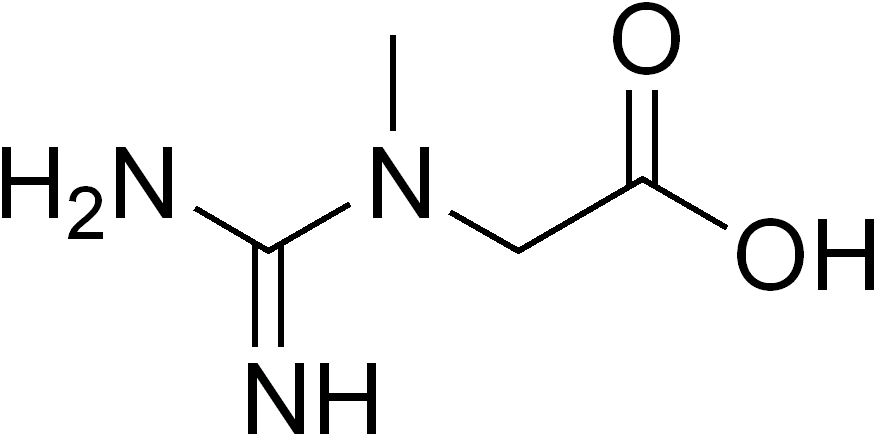Creatine transporter defect
Editor-In-Chief: Prab R Tumpati, MD
Obesity, Sleep & Internal medicine
Founder, WikiMD Wellnesspedia &
W8MD medical weight loss NYC and sleep center NYC
| Creatine transporter defect | |
|---|---|

| |
| Synonyms | X-linked creatine deficiency |
| Pronounce | |
| Specialty | Medical genetics |
| Symptoms | Intellectual disability, speech delay, seizures, autism spectrum disorder |
| Complications | N/A |
| Onset | Infancy or early childhood |
| Duration | Lifelong |
| Types | N/A |
| Causes | Mutations in the SLC6A8 gene |
| Risks | |
| Diagnosis | Genetic testing, magnetic resonance spectroscopy |
| Differential diagnosis | Cerebral palsy, autism, other metabolic disorders |
| Prevention | N/A |
| Treatment | Creatine supplementation (ineffective), symptomatic treatment |
| Medication | Anticonvulsants, behavioral therapy |
| Prognosis | Variable, often involves lifelong management |
| Frequency | Estimated 1 in 100,000 to 1 in 250,000 males |
| Deaths | |
Creatine Transporter Defect (CTD) is a rare genetic disorder that affects the body's ability to transport creatine, a key molecule in energy storage and supply, into cells. This condition primarily impacts the brain, where creatine plays a crucial role in energy metabolism, leading to various neurological and developmental issues. CTD is classified under the broader category of creatine deficiency syndromes, which also includes arginine:glycine amidinotransferase deficiency and guanidinoacetate methyltransferase deficiency.
Causes[edit | edit source]
CTD is caused by mutations in the SLC6A8 gene, which encodes the creatine transporter protein. This protein is responsible for the uptake of creatine into cells, especially in the brain and muscle tissues. Mutations in the SLC6A8 gene lead to dysfunctional or absent creatine transporter proteins, resulting in reduced creatine uptake and subsequent energy deficits in cells.
Symptoms[edit | edit source]
The symptoms of Creatine Transporter Defect can vary widely among affected individuals but commonly include:
- Intellectual disability
- Speech delay and other language impairments
- Behavioral disorders such as autism spectrum disorder and ADHD
- Seizures
- Motor skill delays
- Muscle weakness
Diagnosis[edit | edit source]
Diagnosis of CTD involves a combination of clinical evaluation, biochemical tests, and genetic testing. Biochemical tests may show abnormal levels of creatine or its metabolites in bodily fluids. However, definitive diagnosis is achieved through genetic testing, which can identify mutations in the SLC6A8 gene.
Treatment[edit | edit source]
Currently, there is no cure for Creatine Transporter Defect, and treatment focuses on managing symptoms and improving quality of life. Therapeutic strategies may include:
- Speech therapy for language impairments
- Physical therapy and occupational therapy for motor skill development
- Behavioral therapy for managing autism spectrum disorder or ADHD
- Medications to control seizures
Prognosis[edit | edit source]
The prognosis for individuals with Creatine Transporter Defect varies depending on the severity of symptoms and the effectiveness of management strategies. Early intervention and supportive therapies can improve developmental outcomes and quality of life.
Research[edit | edit source]
Research on CTD is ongoing, with studies focusing on understanding the molecular mechanisms of the disease, exploring potential treatments, and developing more effective diagnostic methods. Gene therapy and other novel therapeutic approaches are areas of interest in the quest to find a cure or more effective treatments for CTD.
Search WikiMD
Ad.Tired of being Overweight? Try W8MD's physician weight loss program.
Semaglutide (Ozempic / Wegovy and Tirzepatide (Mounjaro / Zepbound) available.
Advertise on WikiMD
|
WikiMD's Wellness Encyclopedia |
| Let Food Be Thy Medicine Medicine Thy Food - Hippocrates |
Translate this page: - East Asian
中文,
日本,
한국어,
South Asian
हिन्दी,
தமிழ்,
తెలుగు,
Urdu,
ಕನ್ನಡ,
Southeast Asian
Indonesian,
Vietnamese,
Thai,
မြန်မာဘာသာ,
বাংলা
European
español,
Deutsch,
français,
Greek,
português do Brasil,
polski,
română,
русский,
Nederlands,
norsk,
svenska,
suomi,
Italian
Middle Eastern & African
عربى,
Turkish,
Persian,
Hebrew,
Afrikaans,
isiZulu,
Kiswahili,
Other
Bulgarian,
Hungarian,
Czech,
Swedish,
മലയാളം,
मराठी,
ਪੰਜਾਬੀ,
ગુજરાતી,
Portuguese,
Ukrainian
Medical Disclaimer: WikiMD is not a substitute for professional medical advice. The information on WikiMD is provided as an information resource only, may be incorrect, outdated or misleading, and is not to be used or relied on for any diagnostic or treatment purposes. Please consult your health care provider before making any healthcare decisions or for guidance about a specific medical condition. WikiMD expressly disclaims responsibility, and shall have no liability, for any damages, loss, injury, or liability whatsoever suffered as a result of your reliance on the information contained in this site. By visiting this site you agree to the foregoing terms and conditions, which may from time to time be changed or supplemented by WikiMD. If you do not agree to the foregoing terms and conditions, you should not enter or use this site. See full disclaimer.
Credits:Most images are courtesy of Wikimedia commons, and templates, categories Wikipedia, licensed under CC BY SA or similar.
Contributors: Prab R. Tumpati, MD


